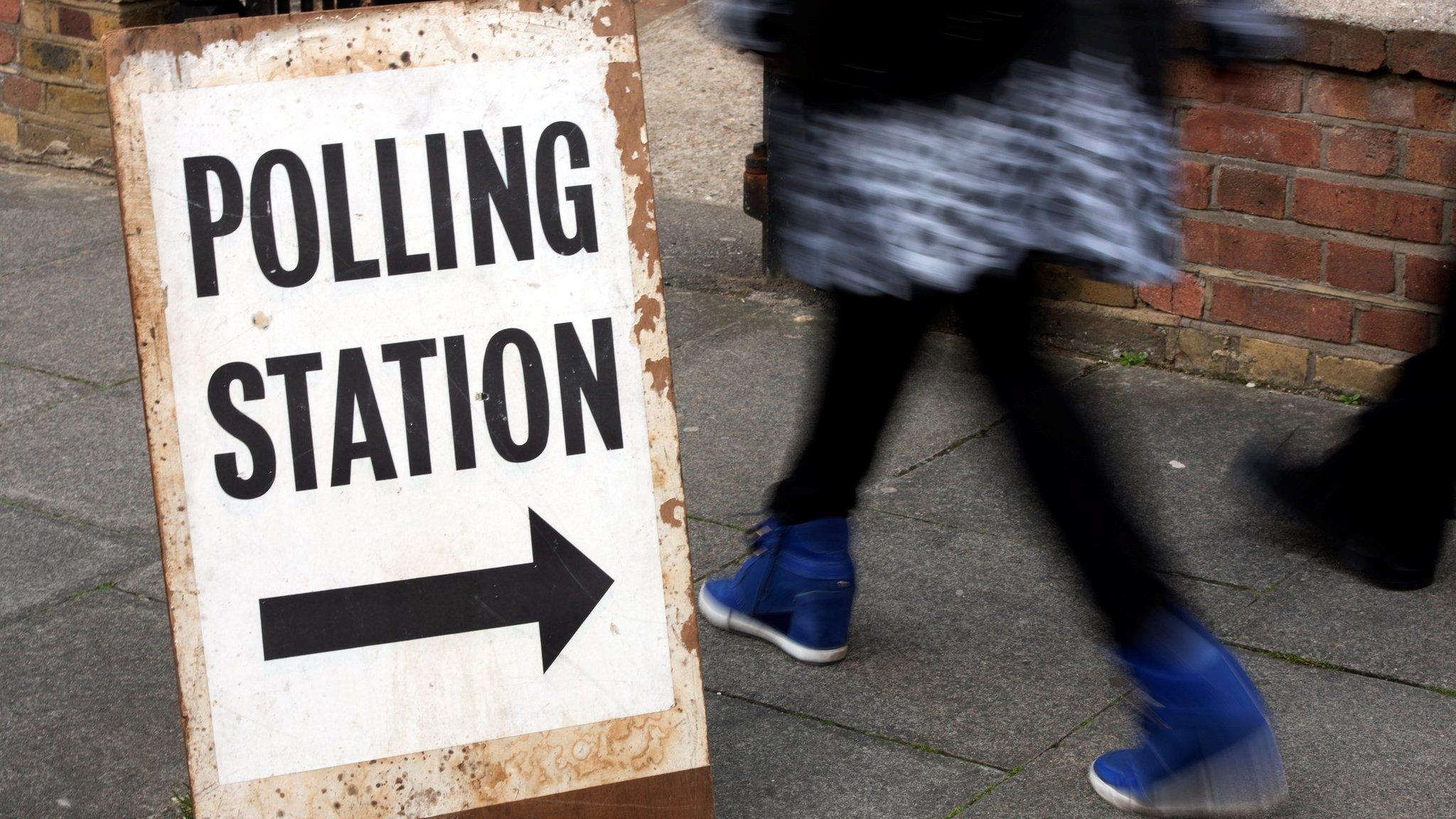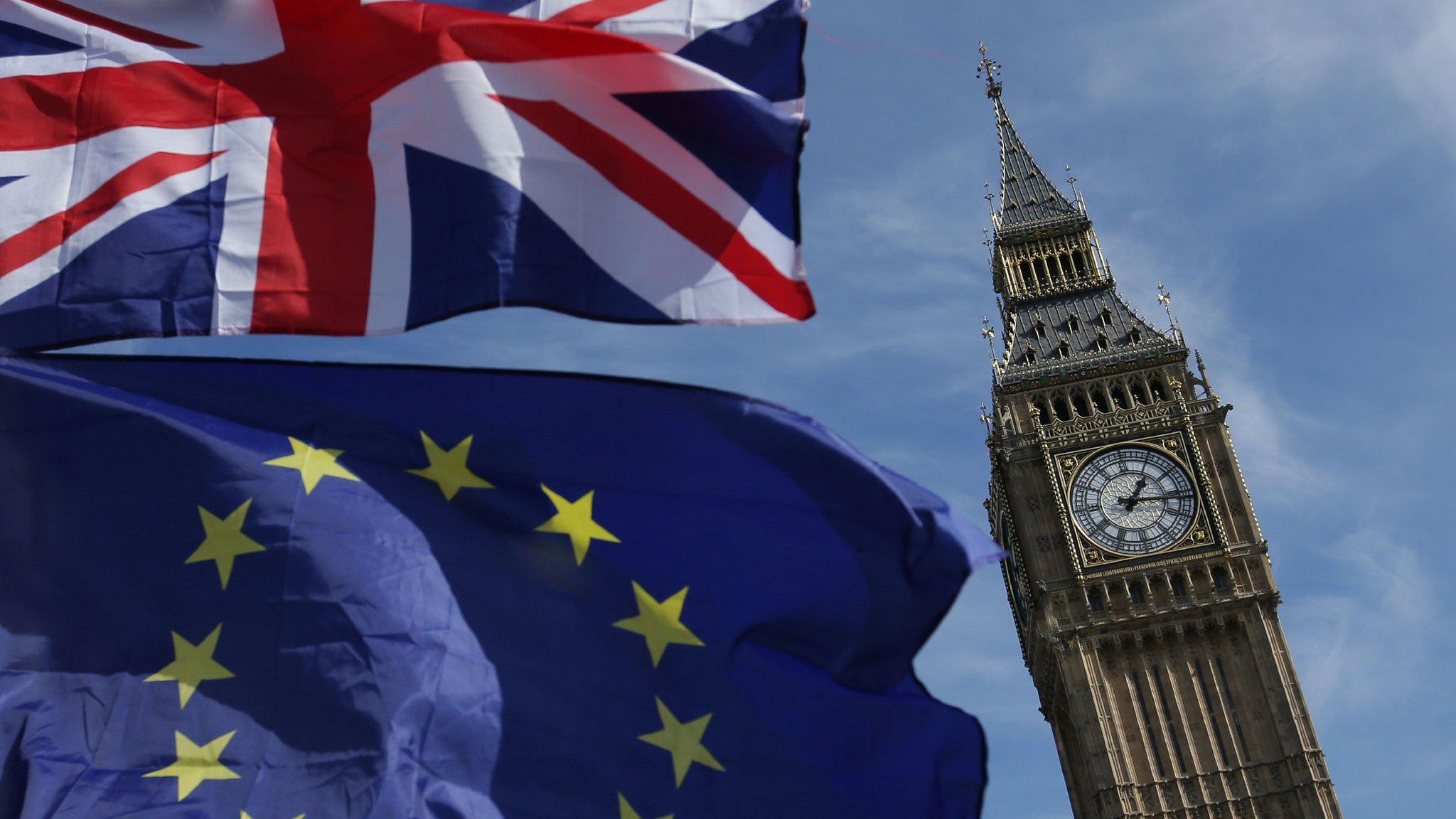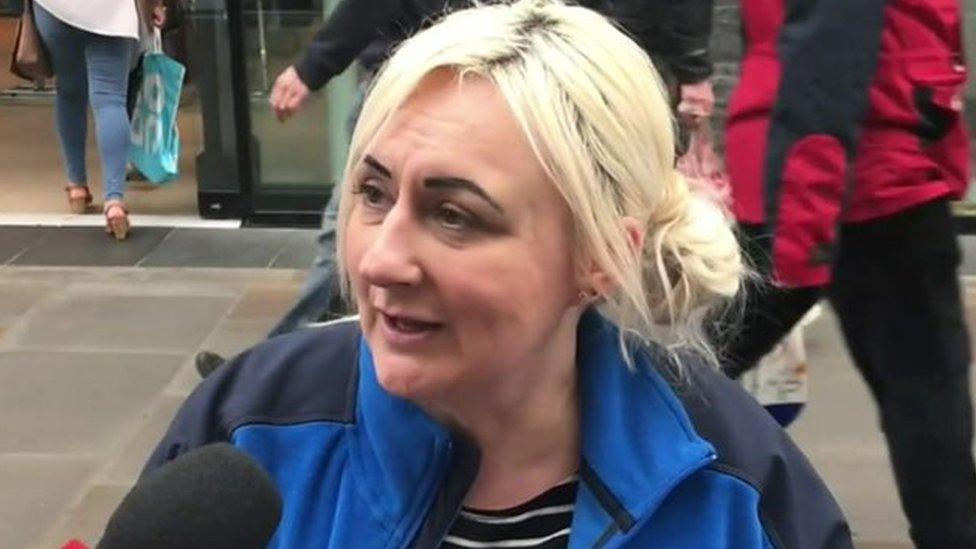General Election 2017: Labour's 'day one' pledge to EU nationals
- Published
Sir Keir Starmer: Free movement set to end
Labour says it would scrap Theresa May's Brexit plans and unilaterally guarantee the rights of EU residents before talks start, if it wins power.
While accepting the UK was leaving, shadow Brexit secretary Sir Keir Starmer said Labour wanted a deal which prioritises jobs and workers' rights.
He also said migration rules had to change and that the EU single market should be kept "on the table".
The Conservatives said only they had a clear plan for exiting the EU.
Ahead of a campaign visit to Wales on Tuesday, Theresa May said the Brexit vote should have been a "wake-up call for a generation of politicians who have taken the people for granted for too long", but instead other parties had "closed ranks".
The Conservatives are hoping to take seats from Labour on 8 June in areas which voted to leave the EU, including the Midlands, the north-east and north-west of England and across Wales.
Most Labour MPs backed Remain vote in last year's referendum.
'No rolling back'
Labour has been criticised by, among others, former prime minister Tony Blair, for a perceived lack of clarity in its approach to Brexit.
Unlike the Lib Dems, it has ruled out offering a second referendum on the terms of any Brexit deal, but suggested Parliament could stop a so-called "hard Brexit".
In Labour's first major policy statement of the election campaign, the party is signalling it would take a different approach to the two-year process of negotiating the EU's exit - expected to start in earnest in June.
It says it would:
Scrap Mrs May's Brexit plan - outlined in a White Paper in February - which envisages leaving the single market and customs union
Focus on a deal that "retains the benefits" of both organisations
Guarantee the legal status of the three million EU nationals living in the UK on its first day in office
Press for a reciprocal guarantee for the 1.2 million Britons living on the continent
Replace the government's proposed Great Repeal Bill - which would scrap the 1972 European Communities Act and transpose myriad existing EU laws applying to the UK into domestic law - with an EU Rights and Protections Bill
Labour also insists there can be no "rolling back" of workplace protections, environmental standards and consumer rights, and no measures to limit the lifespan of any EU-derived laws or directives, such as sunset clauses.
Speaking on BBC Radio 4's Today programme, Sir Keir criticised the prime minister's "rigid" approach, and said offering an immediate, unilateral guarantee to EU nationals living in the UK would be "received as a very welcome message" by Brussels negotiators and help "reset the tone" of talks.

Analysis by BBC political editor Laura Kuenssberg
For months Labour has agonised over its position on Brexit. Wrangling with four seemingly incompatible truths - millions of their voters in traditional Labour areas wanted Brexit; the vast majority of the party's MPs wanted to stay, in line with its official position; the leader was Remain but not exactly in love with the idea, but an important constituency of Labour voters at the New Labour end of things were ardent remainders.
Got it?
In the end, Labour concluded it had to back the government's triggering of Article 50 with a few notable exceptions. And now it has officially backed Brexit. How, on this issue, can they show they are different to the Tories?

There are estimated to be about three million citizens of other EU countries living in the UK, and about 1.2 million British expats living elsewhere in Europe.
The PM has said she wants a reciprocal deal covering both groups' rights to be struck at the earliest possible stage in the negotiations.
Sir Keir also said that while "unchanged" access to the EU single market was "not a viable option", the government should "leave the options on the table".
He said the option of remaining in the customs union should be left on the table, saying it was an "absolute imperative" for businesses to be able to trade as successfully after Brexit as before.
Views from Wakefield: "I'm not into Labour any more"
Mrs May has said the UK "cannot possibly" remain part of the single market as it would mean "not leaving the EU at all". She also says the UK must seek a new customs agreement as its current membership of the customs union prevents it from striking trade deals around the world.
Sir Keir said Labour accepted that the principle of the free movement of people - which EU leaders say goes hand-in-hand with single market membership - would have to end after Brexit.
But he said new immigration controls should not be the "overarching priority" as the UK leaves.
Labour's policy on Brexit? "Search me" Lord Mandelson tells Kirsty Wark
He also insisted MPs should have the option to send the government back to the negotiating table if they are not happy with the outcome of the talks, accusing the government of "trying to knock away any meaningful challenge" to its position.
This was described as "absolutely extraordinary" by UKIP deputy leader Peter Whittle, who told the BBC: "If there is a bad deal, we simply walk away."
Lib Dem leader Tim Farron said Labour had "voted through a hard Brexit", and had "chosen to be neither fish nor fowl on the biggest issue to face our country for a generation".
The Conservatives said Jeremy Corbyn was a "weak leader of a divided party who could not get the right deal for the UK".
"We have a clear plan for the Brexit negotiations, and every vote for Theresa May will strengthen her hand in those negotiations to get a good deal for the UK," said MP and former minister Dominic Raab.
Writing in the Guardian, Mr Blair said the Conservatives' position on Brexit must be "turned against them", and warned Mr Corbyn "this is not the time to fight a conventional partisan election".
Pro-EU campaigners, meanwhile, have launched a new bid to prevent a so-called "hard Brexit".
The "key seat strategy" will attempt to unseat MPs the campaigners say back a "hard Brexit" and support those who oppose it, including Conservative, Labour and Lib Dem politicians.
A spokesman for the Open Britain group said a "hard Brexit" would involve losing the benefits of the single market and weakening workers' rights and environmental protections.
Following the announcement of the plans, sources told the BBC four Conservative MPs - Anna Soubry, Nicky Morgan, Neil Carmichael and Dominic Grieve - were leaving Open Britain, because they did not want to be part of any organisation advocating campaigning against Conservative colleagues.


Are you an EU national living in the UK? How do you feel about Brexit? You can share your comments by emailing haveyoursay@bbc.co.uk, external.
Please include a contact number if you are willing to speak to a BBC journalist. You can also contact us in the following ways:
WhatsApp: +44 7555 173285
Send pictures/video to yourpics@bbc.co.uk, external
Tweet: @BBC_HaveYourSay, external
Text an SMS or MMS to 61124 (UK) or +44 7624 800 100 (international)
- Published22 April 2017

- Published27 March 2017

- Published24 April 2017
